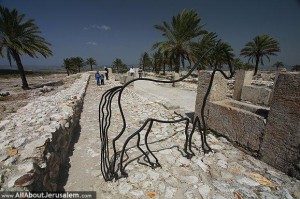The Haftarah of Ki Tisa is the story of Eliyahu at Har HaCarmel, where he proves to the Jewish People that Hashem is G-d and the idol Ba’al is imaginary. At first glance, this Haftarah appears to be the natural choice for the Parsha of Ki Tisa, which recounts the Sin of the Golden Calf: Moshe had to deal with idolatry, and Eliyahu had to deal with idolatry. However, the situations are not parallel, they are inverse. The Parsha starts with the Jewish People serving G-d whole-heartedly and follows with them devolving into worshipping a golden statue. Conversely, the Haftarah starts with the Jewish People serving a pagan god, and follows with them saying “Hashem is G-d,” and serving G-d whole-heartedly.
If one wanted to match the Sin of the Golden Calf with a chapter of Prophets on the topic of idolatry, there is a plethora of chapters to choose from[1]; all of the prophets dealt with idolatry in one way or another. So why was this chapter chosen?
What the Parsha and the Haftarah have in common is not the idolatry, and not Moshe’s or Eliyahu’s ways of dealing with it, but rather how each of them defended their people before G-d. According to the Midrash (Talmud Bavli Berachot 32-33), both Moshe and Eliyahu put the blame for what happened on G-d Himself.
Eliyahu said,
לז) עֲנֵנִי ה’ עֲנֵנִי וְיֵדְעוּ הָעָם הַזֶּה כִּי אַתָּה ה’ הָאֱ-לֹהִים וְאַתָּה הֲסִבֹּתָ אֶת לִבָּם אֲחֹרַנִּית:
“Answer me, Hashem, answer me! So that these people shall know that You, Hashem, are G-d, for You have turned their hearts backwards.” (Melachim I 18:37)
Eliyahu accuses G-d of having turned the hearts of the Jewish People away from Him. They cannot bear the entire blame for their actions if G-d set up a situation that they were not able to handle. The Jewish People had never had an aristocracy; Achav is only the second generation in his dynasty, and the concept of a royal family was relatively new. When Jezebel, the royal princess of the House of Tzidon, became the queen, she saw it as her mission to show the Jews how things ought to be done; to introduce the rituals of the wealthiest, most cosmopolitan, most admired culture in the region into their society, by force if necessary. How could they be expected to match wills with someone like her, to withstand that level of pressure?
We all know that G-d is the ultimate matchmaker. If He had caused this match to fail, or caused Achav to marry someone more suitable, none of this would have happened. Eliyahu holds G-d responsible.
Similarly, according to the same Midrash, when Moshe said,
יא) … וַיֹּאמֶר לָמָה ה’ יֶחֱרֶה אַפְּךָ בְּעַמֶּךָ אֲשֶׁר הוֹצֵאתָ מֵאֶרֶץ מִצְרַיִם בְּכֹחַ גָּדוֹל וּבְיָד חֲזָקָה:
“Why, Hashem, should You be angry at Your people, whom You have taken out of the land of Egypt, with great might and a strong hand?” (Shemot 32:11)
… what he really meant was, “You have no right to be angry after leaving them for generations in the most pagan culture in the world!”
Here is a Midrash that puts it all into a metaphor that only Chazal could permit themselves to use:
א”ר הונא בשם ר’ יוחנן משל לחכם שפתח לבנו חנות של בשמים בשוק של זונות. המבוי עשה שלו והאומנות עשתה שלה והנער כבחור עשה שלו יצא לתרבות רעה. בא אביו ותפסו עם הזונות התחיל האב צועק ואומר הורגך אני. היה שם אוהבו אמר לו אתה איבדת את הנער ואתה צועק כנגדו. הנחת כל האומניות ולא למדתו אלא בשם והנחת כל המובאות ולא פתחת לו חנות אלא בשוק של זונות.כך אמר משה רבון העולם הנחת כל העולם ולא שעבדת בניך אלא במצרים שהיו עובדין טלאים ולמדו מהם בניך. ואף הם עשו העגל לפיכך אמר אשר הוצאת מארץ מצרים דע מהיכן הוצאת אותם.
R’ Huna said from R’ Yohanan: It’s analogous to a scholar who opened for his son a perfume shop in a red-light district full of prostitutes. The location did what it does, the profession did what it does, and the guy did what a guy does.
His father came and caught him with the prostitutes, and started screaming, “I’m going to kill you!” The father’s friend was there, and said to him, “You destroyed the boy, and now you’re screaming at him? Of all possible professions you taught him perfumery; of all possible locations, you opened him a shop in a red-light district?!”
So, too, Moshe said, “Master of the Universe! Of all the nations in the world in which to enslave Your children, You picked Egypt, who worship calves? Your children learned from them and also made a calf!” This is why Moshe said, “whom You have taken out of Egypt”. You should realize where You took them out of! (Midrash Shemot Rabba 43)
Like Eliyahu, Moshe blames G-d for the failure of the Jewish People. It is G-d who is responsible for their pagan mindset. If He didn’t want them to have that influence, He should not have put them in that situation in the first place[2].
This attitude is more than a little bit chutzpadik. If it weren’t Chazal that said it, we certainly would not have dared to interpret Moshe’s or Eliyahu’s words in this manner. But was it wrong of them to blame G-d? Were they punished for it? We know that neither prophet was perfect; Moshe was punished for hitting the rock in his anger rather than speaking to it, and Eliyahu, as we will read in the Haftarah of Pinchas, was censured for some of the things he said. Here, however, there is no hint of censure; not in the text and not in the Midrash. On the contrary, G-d listens to both Moshe and Eliyahu, implying is that the argument is valid and He accepts His share of the blame.
Or maybe He is just really happy that the Jewish People have leaders who are willing to go to such lengths to defend them.
Copyright © Kira Sirote
In memory of my father, Peter Rozenberg, z”l
לעילוי נשמת אבי מורי פנחס בן נתן נטע ז”ל
[1] For instance, Melachim I 12, where King Yeravam makes golden calves and says: “These are your gods, Israel that took you out of Egypt”.
[2] This Midrash directly contradicts the popular saying, “G-d does not put people in situations they cannot handle.”
Like this:
Like Loading...


